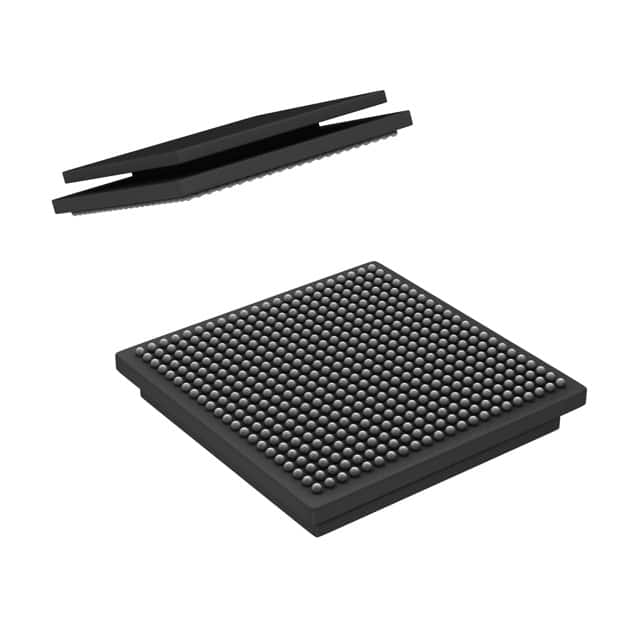TMS320DM647ZUT7
Product Overview
Category
The TMS320DM647ZUT7 belongs to the category of digital signal processors (DSPs).
Use
This product is primarily used for processing and manipulating digital signals in various applications such as telecommunications, multimedia systems, industrial control, and automotive electronics.
Characteristics
- High-performance DSP with integrated peripherals
- Low power consumption
- Advanced architecture for efficient signal processing
- Support for multiple communication protocols
- Flexible and programmable design
Package
The TMS320DM647ZUT7 is available in a compact and robust package, suitable for surface mount technology (SMT) assembly.
Essence
The essence of the TMS320DM647ZUT7 lies in its ability to efficiently process digital signals, enabling high-speed data manipulation and analysis.
Packaging/Quantity
This product is typically packaged in trays or reels, with a quantity of 100 units per package.
Specifications
- Core Clock Speed: 1 GHz
- Instruction Set Architecture: TMS320C64x+
- On-Chip Memory: 256 KB L2 Cache, 32 KB L1 Program Cache, 32 KB L1 Data Cache
- External Memory Interface: DDR2, SDRAM, NOR Flash, NAND Flash
- Communication Interfaces: Ethernet MAC, USB, UART, SPI, I2C
- Analog-to-Digital Converter (ADC): 12-bit, 8 channels
- Digital-to-Analog Converter (DAC): 12-bit, 2 channels
- Operating Voltage: 1.2V - 1.4V
- Power Consumption: 1.5W (typical)
Detailed Pin Configuration
The TMS320DM647ZUT7 has a total of 361 pins, which are assigned to various functions and interfaces. The detailed pin configuration can be found in the product datasheet.
Functional Features
- High-performance DSP core for efficient signal processing
- Integrated peripherals for seamless connectivity
- Support for multiple communication protocols, enabling versatile applications
- On-chip memory for fast data access and storage
- Low power consumption for energy-efficient operation
- Programmable design for flexibility and customization
Advantages and Disadvantages
Advantages
- High processing power for demanding applications
- Versatile communication interfaces for easy integration
- Efficient memory management for optimized performance
- Low power consumption for energy-saving operation
- Flexible programming options for customization
Disadvantages
- Complex architecture may require a learning curve for new users
- Limited availability of alternative models with similar specifications
- Higher cost compared to some other DSPs in the market
Working Principles
The TMS320DM647ZUT7 operates based on the principles of digital signal processing. It utilizes its high-performance DSP core to perform mathematical operations on digital signals, such as filtering, modulation, demodulation, and encoding/decoding. The integrated peripherals and communication interfaces enable seamless interaction with external devices and systems.
Detailed Application Field Plans
The TMS320DM647ZUT7 finds extensive application in various fields, including:
- Telecommunications: Used in base stations, wireless infrastructure, and voice/data communication systems.
- Multimedia Systems: Employed in audio/video processing, image recognition, and multimedia streaming applications.
- Industrial Control: Utilized in automation systems, robotics, and process control applications.
- Automotive Electronics: Integrated into automotive infotainment systems, advanced driver assistance systems (ADAS), and engine control units (ECUs).
Detailed and Complete Alternative Models
While the TMS320DM647ZUT7 offers unique features and capabilities, there are alternative models available in the market that can be considered for similar applications. Some notable alternatives include:
- TMS320C6748: A high-performance DSP with integrated peripherals and low power consumption.
- ADSP-BF707: A digital signal processor with advanced connectivity options and efficient processing capabilities.
- STM32F469xx: A microcontroller with DSP extensions, suitable for applications requiring both control and signal processing.
These alternative models provide different trade-offs in terms of performance, power consumption, and cost, allowing users to choose the most suitable option for their specific requirements.
Word count: 536 words
قم بإدراج 10 أسئلة وإجابات شائعة تتعلق بتطبيق TMS320DM647ZUT7 في الحلول التقنية
Sure! Here are 10 common questions and answers related to the application of TMS320DM647ZUT7 in technical solutions:
Q: What is TMS320DM647ZUT7? A: TMS320DM647ZUT7 is a high-performance digital signal processor (DSP) from Texas Instruments, designed for applications requiring advanced signal processing capabilities.
Q: What are the key features of TMS320DM647ZUT7? A: Some key features include a 1 GHz DSP core, integrated ARM926EJ-S core, multiple communication interfaces, video and imaging peripherals, and extensive memory options.
Q: What are the typical applications of TMS320DM647ZUT7? A: TMS320DM647ZUT7 is commonly used in applications such as video surveillance systems, industrial automation, medical imaging, automotive infotainment, and multimedia processing.
Q: How can I program TMS320DM647ZUT7? A: TMS320DM647ZUT7 can be programmed using various development tools, including Code Composer Studio (CCS), which provides an integrated development environment (IDE) for software development.
Q: What programming languages are supported by TMS320DM647ZUT7? A: TMS320DM647ZUT7 supports programming in C and assembly language. Additionally, there are libraries and frameworks available for specific applications, such as video and image processing.
Q: Can TMS320DM647ZUT7 handle real-time processing requirements? A: Yes, TMS320DM647ZUT7 is specifically designed for real-time processing applications, with its high-performance DSP core and optimized architecture.
Q: What are the power requirements for TMS320DM647ZUT7? A: TMS320DM647ZUT7 typically operates at a supply voltage of 1.2V for the core and 3.3V for I/Os. The power consumption depends on the specific application and operating conditions.
Q: Are there any development boards available for TMS320DM647ZUT7? A: Yes, Texas Instruments offers development boards like the TMDXEVM6474, which provide a platform for prototyping and evaluating solutions based on TMS320DM647ZUT7.
Q: Can TMS320DM647ZUT7 interface with external devices? A: Yes, TMS320DM647ZUT7 supports various communication interfaces such as Ethernet, USB, UART, SPI, and I2C, allowing it to interface with a wide range of external devices.
Q: Is technical support available for TMS320DM647ZUT7? A: Yes, Texas Instruments provides technical support through their website, forums, and documentation. Additionally, there are online communities where developers can seek assistance from fellow users.


